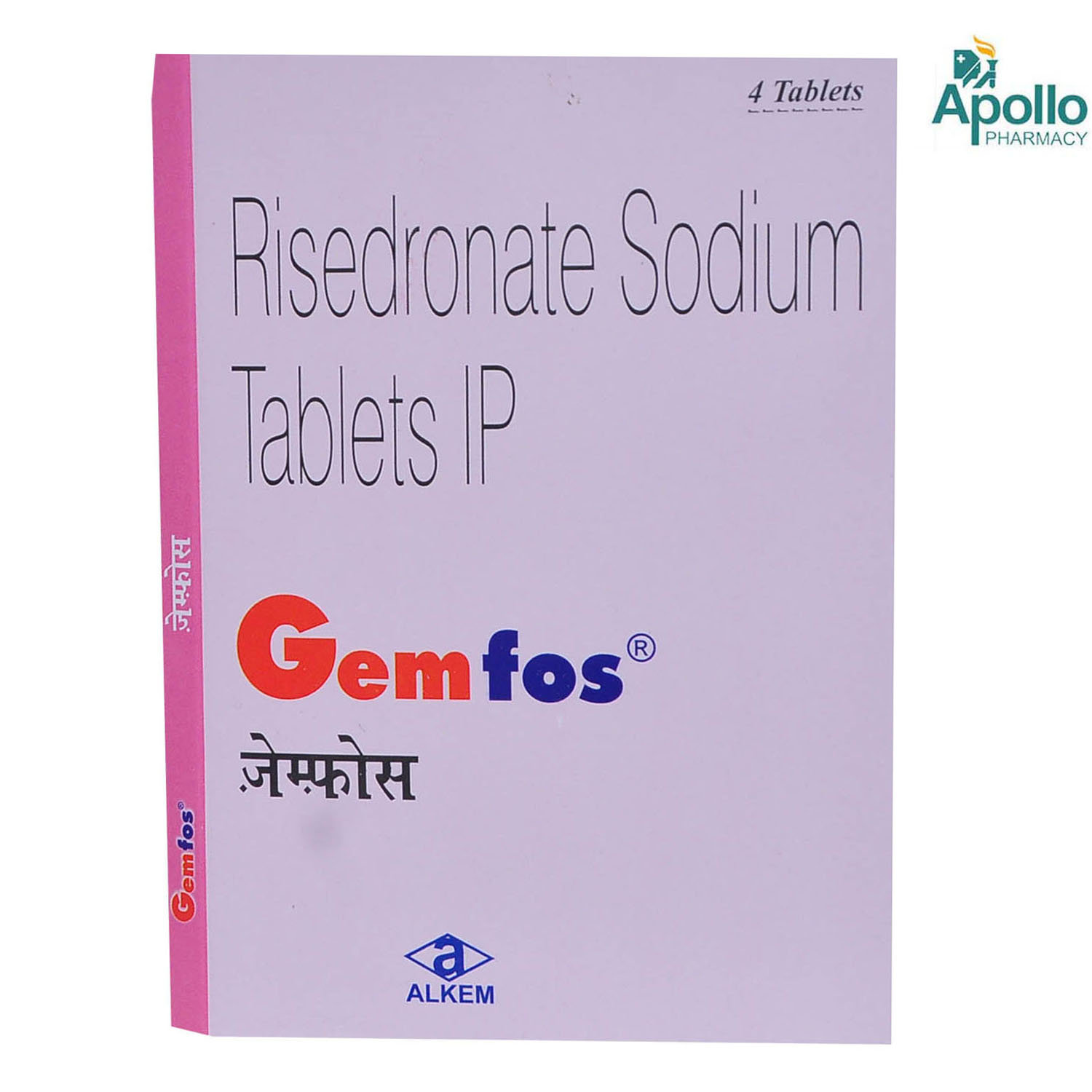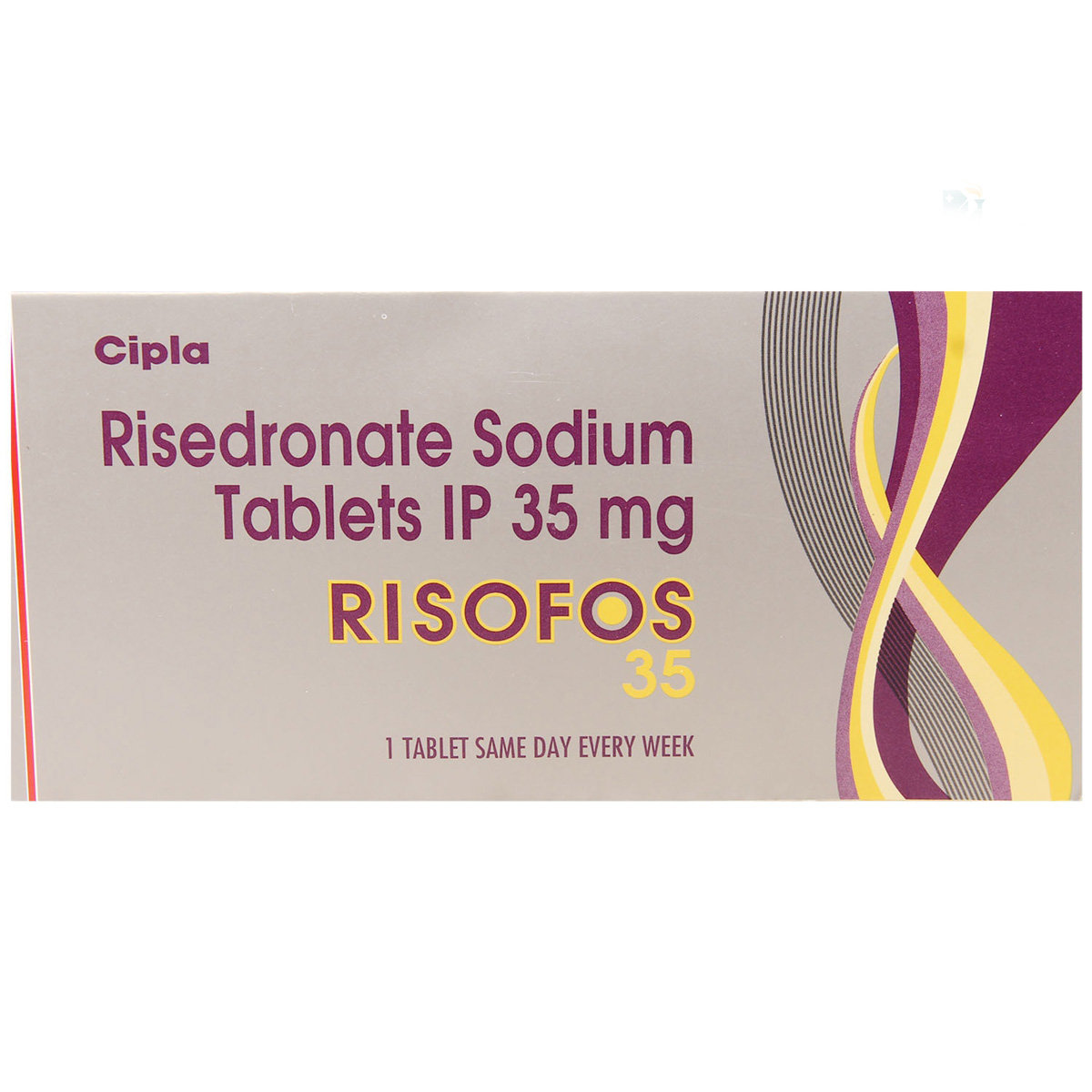Risedronate Sodium
About Risedronate Sodium
Risedronate Sodium belongs to groups of medications called bisphosphonates. It helps your bones stay as strong as possible. It can help if you have or are at risk of getting a health problem called osteoporosis. This is where your bones get weaker and are more likely to break. Osteoporosis can happen for many reasons, but you're more likely to get it if you're a woman who has been through menopause or if you take steroids, for a long time. Some types of cancer treatment can also increase your risk of getting osteoporosis. Besides this Risedronate Sodium can also help people who have Paget's disease of bone. This weakens your bones and can bend them out of shape.
Risedronate Sodium contains 'Risedronate sodium' that comes in the category of drugs known as 'amino bisphosphonate”. In osteoporosis, It works by slows down the cells that break down bone. This maintains bone density and makes your bones stronger and less likely to break. In Paget's disease of bone, Risedronate Sodium reduces the abnormal bone turnover that this condition causes. This helps to reduce deformity and pain and makes your bones stronger and less likely to break.
Take Risedronate Sodium without food on an empty stomach, at evenly spaced intervals with one glass of water. Do not crush, chew, or break it. Your doctor will advise you how often you take Risedronate Sodium based on your medical condition. It has been reported that some persons experience undesirable effects of name that include abdominal or stomach pain, ulceration of the gullet heartburn, difficulty swallowing, difficulty or pain upon swallowing. Most of these side effects of Risedronate Sodium do not require medical attention and gradually resolve over time. However, if the side effects persist or worsen or if you notice chest pain, new or worsening heartburn, or pain when swallowing, then immediately stop taking Risedronate Sodium and consult your doctor.
The use of Risedronate Sodium is restricted in persons who are allergic to any constituent of medication or have problems with oesophagus or low calcium levels in the blood. This medicine should not be taken by a person who cannot sit upright stand for at least half an hour after taking this drug. This medication can increase the risk of jaw bone problems (osteonecrosis), high in persons with pre-existing dental problems, or people treated with steroids, cancer, blood cell disorders, or radiation. So, consult with the doctor about the risks associated with Risedronate Sodium. This medicine is only a part of a complete treatment program that includes bone mineral density testing, diet changes, exercise, and taking calcium and vitamin supplements, so follow all the directions given by the doctor.
Uses of Risedronate Sodium
Medicinal Benefits
Risedronate Sodium contains 'Risedronate sodium' which comes in the category of drugs known as 'amino bisphosphonate”. In osteoporosis, It works by slowing down the cells that break down bone. This maintains bone density and makes your bones stronger and less likely to break. In Paget's disease of bone, Risedronate Sodium reduces the abnormal bone turnover that this condition causes. This helps to reduce deformity and pain and makes your bones stronger and less likely to break.
Directions for Use
Storage
Side Effects of Risedronate Sodium
- Back pain
- Arthralgia (pain in a joint)
- Abdominal pain
- Dyspepsia (indigestion)
- Hypersensitivity reactions (angioedema, generalized rash, bullous skin reactions)
- Eye inflammation (iritis, uveitis)
Drug Warnings
Risedronate Sodium is not advised in persons who have problems with the esophagus, or low calcium levels in their blood. After taking this medicine, a person should sit upright or stand for at least half an hour; otherwise, it can cause serious stomach or esophagus problems. Risedronate Sodium can increase the risk of jaw bone problems (osteonecrosis), especially in those treated with steroids, chemotherapy, radiation, cancer, blood cell disorders, and pre-existing dental problems. Risedronate Sodium is only an only part of a complete program that includes diet modification, regular exercise, bone mineral density testing, and consuming calcium and vitamin supplements. A person should consult with their doctor's if they ever had trouble swallowing, problems with their stomach or digestion, hypocalcemia, a dental problem (you may need a dental exam before you begin taking alendronate), kidney disease; or any condition that makes it hard for your body to absorb nutrients from food (malabsorption) before taking this medicine. Pregnant ladies should first consult with their doctor before taking Risedronate Sodium as it is not known whether this medicine will harm an unborn baby. Breastfeeding women should first consult with the doctor before taking Risedronate Sodium to pass into breast milk and affect the infant.
Drug Interactions
Drug-Drug interactions: Risedronate Sodium may interact with other medications, vitamins, or herbs that could be harmful or prevent the medicine from working well. Possible drug interactions include Calcium Supplements/Antacids and Nonsteroidal Anti-Inflammatory Drugs (aspirin, naproxen, diclofenac).
Drug-Food interactions: Foods like mineral water, coffee, tea, or juice may decrease the absorption of Risedronate Sodium.
Drug-Disease interactions: Risedronate Sodium is not allowed to use in some patients dealing with aspiration, ONJ (Osteonecrosis of the jaw), hypocalcemia, upper GI mucosal irritation, cardiovascular disease, renal dysfunction, and asthma.
Drug-Drug Interactions Checker List:
Safety Advice

Alcohol
unsafeA person should limit the consumption of alcohol as it can increase the risk of stomach side effects from Risedronate Sodium. Talk to the doctor they will check the stomach problems.

Pregnancy
safe if prescribedIt is unknown that Risedronate Sodium may harm the baby or not so tell your doctor if you are pregnant or planning to be pregnant.

Breast Feeding
unsafeRisedronate Sodium can pass directly in breast milk and harm the nursing baby, so do not take Risedronate Sodium while breastfeeding.

Driving
safe if prescribedRisedronate Sodium does not influence a person's ability to drive so one can drive safely.

Liver
cautionRisedronate Sodium should be taken with caution and should only be advised when suggested by the doctor.

Kidney
cautionTell your doctor if you have kidney disorders as after checking the health condition, they will decide that this medicine is safe to prescribe or not.

Children
unsafeRisedronate Sodium should not be given to children or adolescents whose age is less than 18 years.
Habit Forming
Diet & Lifestyle Advise
- A person should consume calcium and vitamin D in their diet as it helps make stronger bones and avoid everyday osteoporosis dangers.
- A post-menopausal woman should limit salt intake as it can pose a high risk of losing more bone minerals than other women of the same age.
- Do regular exercise like weight-bearing exercises which are important for maintaining bone health.
- Calcium is important for making bones strong. Vitamin D is equally important, which helps to ensure the absorption and retention of calcium in bones, so take food high in calcium and vitamins.
Special Advise
Certain diagnostic test like bone density scan is used to check bone mineral density (BMD).
Patients Concern
Disease/Condition Glossary
Osteoporosis: It is a medical condition that causes thinning and weakening of the bones. It usually happens in women after menopause. When a woman reaches her menopause stage, her ovaries stop making estrogen, a female hormone responsible for keeping a woman’s skeleton healthy. Due to a lack of estrogen, the bone starts becoming weaker due to bone loss. The earlier a woman reaches the menopause stage, the greater the chances of osteoporosis. In starting days, osteoporosis does not show any symptoms. However, if proper treatment is not provided, then it can even lead to broken bones. Initially, the bones don't hurt, and breaks in the spine's bones may go unseen until they cause height loss. In Osteoporosis, bones can break even during daily activities like lifting or even from minor activities. Bones usually occur at the hip, spine, or wrist which can even lead to stooped posture (‘dowager’s hump’) and loss of movement.
FAQs
In osteoporosis, Risedronate Sodium works by slows down the cells that break down bone. This maintains bone density and makes your bones stronger and less likely to break. In Paget's disease of bone, Risedronate Sodium reduces the abnormal bone turnover that this condition causes. This helps to reduce deformity and pain and makes your bones stronger and less likely to break.
A person who is allergic to any component present in Risedronate Sodium or have digestive problems, problems swallowing or any problems with your food pipe or low calcium levels in the blood have kidney problems, are pregnant or breastfeeding, or trying to get pregnant, have cancer, or are having chemotherapy or radiotherapy should not take Risedronate Sodium.
It has been seen that Risedronate Sodium increases the risk of jaw bone problems (osteonecrosis) especially in persons with pre-existing dental problems, or people treated with steroids, cancer, blood cell disorders, chemotherapy, or radiation.
It is advised not to breastfeed while taking Risedronate Sodium as this medicine can pass into breastmilk. Consult with your doctor about any risk.
A person should do the extra care of their dental hygiene while taking Risedronate Sodium and If they are going for any dental work (especially surgery), they should tell the dentist ahead of time that they are taking this medicine.
Persons whose age is more than 35 years have low estrogen levels, females reaching menopause, too much alcohol consumption, tobacco, or caffeine, and lack of calcium and vitamin D in the foods are some of the factors that can increase the risk of osteoporosis.
If a person notices serious problems in the stomach or oesophagus, they should stop taking Risedronate Sodium and report to the doctor.
Risedronate Sodium is a part of a complete program that includes modifications in diet, regular exercise, bone mineral density testing, and intake of calcium and vitamin supplements. Follow all the guidelines given by the doctor very closely.
A person should limit or quit smoking as it can reduce the bone mineral density, and increases the risks of fractures.






